Tennessee Valley Woodworkers
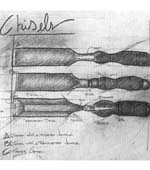 Vol. 18/ Issue 4
April 2003
Editor: Tom Gillard Jr.
Vol. 18/ Issue 4
April 2003
Editor: Tom Gillard Jr. 
Tennessee Valley Woodworkers
 Vol. 18/ Issue 4
April 2003
Editor: Tom Gillard Jr.
Vol. 18/ Issue 4
April 2003
Editor: Tom Gillard Jr. 
Meeting Notice:
The next meeting of the TN Valley Woodworkers
Will be held, April 15 at 7:00 p.m. in the
Duck River Electric Building, Decherd, TN
All interested woodworkers are invited!
The following people have agreed to serve as contacts for their particular skills. If you have questions, suggestions for activities, or other comments relating to these skills, please call these folks. Their interest is to help the club better serve their area of expertise. Your participation with them will help them achieve that goal.
Design: Alice Berry 454-3815
Finishing: Phil Bishop 967-4626
Turning: Tom Church 967-4460
Carving: Harry May 962-0215
Sharpening: Bob Reese 728-7974
Joinery: Ross Roepke 455-9140
Health and Safety: Maurice Ryan
962-1555
![]()
List of Club Officers
![]()
GOD BLESS AMERICA!

Please remember, in your thoughts and prayers, all our Troops heading
for and in the Middle East.
FOR MEMBERS ONLY
Don't forget about the club give-away this year.
We have a Tormek sharpening machine for some lucky winner at the Christmas
party.
SPRING SEMINAR
APRIL 26th
“Tool Making for Woodworkers”

The Tennessee Valley Woodworkers will hold our Spring Seminar on April 26, 2003 at the Franklin County High School Vocational Education shop.The seminar will be on “Tool Making for Woodworkers” and will cover some very basic theory and a number of practical demonstrations.The objective is to have attendees leave the seminar able to make specialized tools in their own shop.Gary Runyon, Bob Reese, and Doyle McConnell will be the presenters.
Registration
will begin at 8:00 AM with beverages and pastries.The
first session will begin at 8:30.There
will be a one-hour break at about 11:30 for lunch at your choice of the
local restaurants.The first afternoon
session will begin at 12:30.We expect
to be done my about 3:30 PM.
Cost
for the seminar will be $20 per person.
Address
any questions to the seminar chairman, Hugh Hurst at 931-967-0507 or on
the web at hughhurst@netscape.net.
This
promises to be an excellent seminar.Woodworkers
are constantly confronted with the need for a tool for special applications.Here’s
some help on getting those tools without spending a fortune purchasing
them and while having a little fun and satisfaction making them.
First the bad news---- Twenty-one of our members are in danger of NOT receiving "Splinters" next month because they have not paid their 2003 dues.
Now the good news--- Eighty-four of our members who have paid their 2003 dues will continue to receive this splendid newsletter. They will know of all the club activity, know what went on it our meetings, know about committee meetings, be reminded of the date of our next meeting, get the latest update on seminars, get timely information about their favorite hobby, and lots of other good stuff! Also those members in good standing who have paid their dues for the 2003 calendar year will be eligible for the Grand Door Prize.
Each year after the April meeting it is my unpleasant task to remove those who choose not to renew their membership from the membership rolls.
If you have not paid your 2003 dues please do so at the April meeting.
If you can not be at the April meeting, call me at 393-3191 or email me,
HENRY
DAVIS , let me know that you do intend to continue your membership
and your newsletter will continue to arrive. If you just can’t remember
if you paid your dues or not, contact me and I will be happy to check my
records.
Henry Davis, Treasurer
Joinery Workshop
Henry Davis plans to present and joinery workshop. The project will be an Arts and Crafts type Taboret Table/Plant Stand. You may recall seeing Henry’s plant stand at a recent meeting. The Workshop will be held at Henry’s shop in Tullahoma and he will be assisted by Tom Cowan. The time frame for this Workshop has not been set but will likely be during the first week of May. Each participant will be asked to provide his or her own material for the project, a material list will be provided. . Tom Gillard has agreed to provide a material package in Oak or Poplar at a nominal cost. It’s estimated the workshop will take two days, but please allow for a third day if needed. Henry will have more information and a sign-up sheet at the April meeting.
PRESENTATION BY GEOFF ROEHM ON CRAFTSMANSHIP AND GUITAR ASSEMBLY.
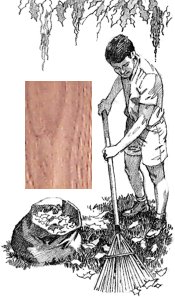
The
tree that keeps you raking.
Travelers
through the Deep South marvel at theeerily
beautiful live oak trees with their draping of Spanish moss.
From
southeastern Virginia down the coast and along the Gulf of Mexico into
Texas, this easily transplanted tree has long been popular as an ornamental.
Homeowners
and others charged with grounds-keeping chores soon learn how the live
oak (Quercus virginiana) got its name. Because the tree constantly grows
new leaves, it is forever green, and thus live. However,
the new leaves replace those that fall, which means constant raking for
the fastidious. And with a tree that frequently has branches extending
three times as broad as its height, that's a lot of labor.
Although now seldom used for commercial purposes, the hard, strong, and heavy wood of live oak was historically quite important. When ships were made entirely of wood, live oak provided the material for the angular parts of a ship's frame called the "knees." These were sawn from the nearly 60° junction of the tree's trunk with its large roots. The natural knees thus had interlocking grain that proved much stronger than straight timber cut and joined to the same shape. The U.S. government thought the wood so valuable for the country's ships that by 1845 it had acquired about 250,000 acres of live oak timberland in the South as a future reserve. But as the days of sail and wooden ships passed, the larder of live oak land was returned to the public for eventual settlement.
SHOW
AND TELL:
John
Sargent brought in a large bowl he rough turned on July 11, 2002 at
Hugh Hurst’s shop and than last week he finished it at Dean Lutes’s shop.He
made it out of Ash.
Henry
Davis brought in a
plant stand
and
said he would do a workshop on how to make one like it.It
has a lot of different types of joints incorporated in it.Next
month he will have more details on the workshop.He
also showed a picture frame, which will
display a painting of scenery, and the frame represents a window.It
was made out of fir and coated with white primer and finished with antique
white.It was made out of 8 pieces
of wood using lap joints and gluing them together.
Winfield
Bennett showed a chain he made several years ago which has letters
carved in it.
Tom
Gillard brought in a table he made inspired from a Thomas Mosher catalog
of furniture.He made it out of walnut
and it has dovetail drawers.He rounded
the corners since he dropped it so rounded them to make all sides match.The
legs flare out and he used lacquer for his finish.
Phil
Bishop brought in pictures of some of his work.One
was of a repair of a sideboard out of rosewood.He
showed a picture of a Wing Griffin dining room set, which he repaired,
wings and replaced one of the feet.This
set will probably sell for $25,000 to $30,000 at auction.He
also designed and carved a piece for a 1700 to 1800 bed.
Doyle
McConnell showed a Henry inspired box. He uses a piece of wood for
the matched 4-section top that was originally destined for the wood stove.It
was a very figured piece.He also
put a drawer in the box.He turned
a bowl out of Box Elder, which had lots of nice red grain through it.
Howard
Coulson likes Blue birds and he showed an old TVA wildlife poster.He
also showed a blue birdhouse he made that opens on the side for clean out.He
feeds the Blue bird’s mealworms in a dish and he brought some of them to
show also.He said by feeding them
the mealworms he has almost made the Blue birds tame.He
brought some extra patterns for those that want them.
Dan
Wilkinson made a box with a very figured walnut top and the rest was
Mahogany.He made the feet with a
one-pass router bit.He also brought
a picture of a fireplace mantel that he made out of Black Walnut. He also
brought a piece of Box Elder that was out of the heart of the tree.He
said his sawmill has no trouble cutting small lengths about 34 inches long.
Jim
Van Cleave showed Maple bookends he hand carved. He brought a lot of
different
type bookends.He showed one
where he had incorporated a busted automobile
ring in the design.He also had
several carved ones.
Bill
Davis brought in an old piece of wood that had been in a floor and the
members thought that is was probably Chestnut.He
went to a class in Gatlinburg and made a box, which he showed.He
showed a small oval box out of oak, which
had a lot of interesting grain.He
also likes blue bird boxes and encourages people to make them and they
will attract blue birds and help to keep the population of blue birds growing.
Steve
Shores brought in a turned mirror, which
he carved a letter on.
Ken
Gould said he has made about 6 or 7 Blue birdhouse and the people he gave
them to painted them blue but Blue birds prefer Grey. He said put in a
bottom that will slide out and if an unwanted sparrow starts to build a
nest in it just slide out the bottom and dump the nest.He
showed a Box Elder bowl that he turned.
He also made a Spalted Walnut natural edge bowl.He
used water based polyurethane spray on it but the can did not spray correctly
and he was not satisfied with the results.
Bob
Leonard made a wooden knife out of Spalted
Maple with a Deft finish. He also made a couple of boxes for housing
the knifes.He used 24 species of
wood between the knife and box.
John
Mayberry turned a bowl from Box Elder
and
used polyurethane hi gloss on it.He
also made 2 Black Walnut bowls and he used low sheen polyurethane on them.
Bob
Beswetherick showed a mandolin he built
in his apartment bedroom.It was
an A style with a Spruce top with cherry sides and cherry headstock. He
used water base lacquer on it.He
made another one that was an F2 type out of curly cherry and a Spruce top
and Pupauk.It takes him about 100
hours to make one.On this one he
used Shellac for the finish.
Ross
Roepke made a wall hanging for the church out of Black Walnut and Mahogany.He
also made a portable podium, which the
top tilts.He put an aluminum rod
in the base for strength.He also
made a slide for his table saw instead of using the provided miter gauge
slide so that he knows it will always be square.
Ray
Torstenson showed some of his pencil drawings some from Mexico and some
from Sewanee.
![]()
Tip
of the Day
Throat Plate Prevents Small Part Losses
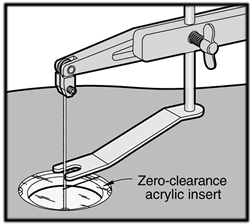
Scrollsaws excel at cutting small pieces. But the smallest of these wooden parts have an annoying tendency of falling through the opening in the throat plate of the saw. To prevent this problem, build your own zero-clearance throat insert plates for your scrollsaw.
Cut
your auxiliary throat plate from a piece of 1/8" acrylic to the exact outline
of your saw’s standard throat plate. If the 1/8" acrylic plate does not
sit flush with your table, try a different thickness of acrylic, or shim
the plate from below. Now, drill a 3/32" hole centered in the acrylic plate
for the blade to go through. Then, scrollsaw a line from the edge of the
acrylic plate up to the hole, and you’re ready to go.
—Tony Lammers, Grand Rapids, Mich.
![]()
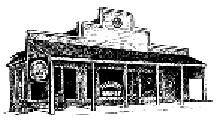
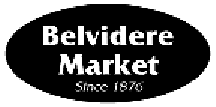
10 % OFF Fine Woodworking
Books from Taunton Press
…We’re open Monday thru Saturday